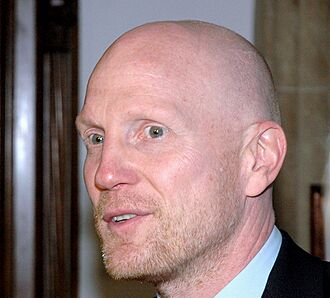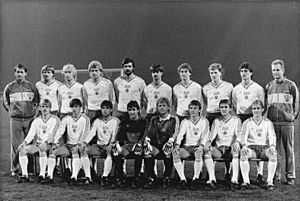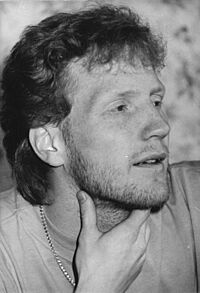Matthias Sammer facts for kids

Sammer in 2013
|
|||||||||||||||||||
| Personal information | |||||||||||||||||||
|---|---|---|---|---|---|---|---|---|---|---|---|---|---|---|---|---|---|---|---|
| Date of birth | 5 September 1967 | ||||||||||||||||||
| Place of birth | Dresden, East Germany | ||||||||||||||||||
| Height | 1.81 m (5 ft 11 in) | ||||||||||||||||||
| Position(s) | Defensive midfielder, sweeper | ||||||||||||||||||
| Youth career | |||||||||||||||||||
| 1976–1985 | Dynamo Dresden | ||||||||||||||||||
| Senior career* | |||||||||||||||||||
| Years | Team | Apps | (Gls) | ||||||||||||||||
| 1985–1990 | Dynamo Dresden | 102 | (39) | ||||||||||||||||
| 1990–1992 | VfB Stuttgart | 63 | (20) | ||||||||||||||||
| 1992–1993 | Inter Milan | 11 | (4) | ||||||||||||||||
| 1993–1998 | Borussia Dortmund | 115 | (21) | ||||||||||||||||
| Total | 291 | (84) | |||||||||||||||||
| International career | |||||||||||||||||||
| 1986–1990 | East Germany | 23 | (6) | ||||||||||||||||
| 1990–1997 | Germany | 51 | (8) | ||||||||||||||||
| Managerial career | |||||||||||||||||||
| 2000–2004 | Borussia Dortmund | ||||||||||||||||||
| 2004–2005 | VfB Stuttgart | ||||||||||||||||||
| 2012–2016 | Bayern Munich (sports director) | ||||||||||||||||||
|
Medal record
|
|||||||||||||||||||
| *Club domestic league appearances and goals | |||||||||||||||||||
Matthias Sammer (born September 5, 1967) is a famous German football player, coach, and official. He played as a defensive midfielder and later as a sweeper, which is a special kind of defender who plays behind the main defensive line.
As a player for Borussia Dortmund, Sammer won many important titles. These included the Bundesliga (Germany's top football league) and the DFB-Supercup in 1995. He won them again in 1996, and in that year, he was also named the European Footballer of the Year. In 1997, he helped Dortmund win the UEFA Champions League, which is Europe's biggest club competition, and the Intercontinental Cup.
Sammer also had a great international career. He played for the East Germany national football team and later for the unified Germany national football team. Germany won the UEFA Euro 1996 with Sammer as a key player. He was even named the best player of that tournament. Later that year, he received the Ballon d'Or award, which is given to the best football player in Europe. Sammer played a total of 74 international matches. He is known as one of the greatest defenders ever because he was excellent at reading the game, intercepting passes, and tackling.
After his playing career, Sammer became a successful coach. As a manager, he led Borussia Dortmund to another Bundesliga title in 2002.
Contents
Playing Career: Matthias Sammer's Club Journey
Starting Out at Dynamo Dresden
Matthias Sammer began his football journey at Dynamo Dresden. He joined their youth team when he was just nine years old in 1976. He made his first appearance for the senior team in the 1985–86 season. At that time, his father, Klaus Sammer, was the team's manager.
In his first season, Sammer played as a striker and scored eight goals. Dynamo Dresden finished fifth in the DDR-Oberliga, which was the top league in East Germany. The next season, he moved to the left wing. By the 1987–88 season, he found his best position in central midfield.
Sammer was part of the Dynamo Dresden team that won the East German championship in the 1988–89 season. That same year, the club reached the semi-finals of the 1988–89 UEFA Cup, a European competition. They were knocked out by the West German club VfB Stuttgart. The following year, Dynamo Dresden won both the league title and the cup, achieving a "double" victory.
While playing for Dynamo Dresden, Sammer was formally part of the Volkspolizei, which was the police force in East Germany. Many players from Dynamo Dresden were assigned to a special regiment for their military service. Sammer explained that he would not have been able to continue playing football for the club if he had refused this service. He said that he never used any weapons or took part in military exercises. He described this arrangement as a way for him to keep playing football for Dynamo Dresden.
Moving to VfB Stuttgart
In the summer of 1990, Sammer moved to VfB Stuttgart, a club in the Bundesliga (the top German league). In his first season, he scored 11 goals, helping Stuttgart finish sixth. The next year, Sammer scored nine goals. This helped Stuttgart become the first champions of the unified Germany after the country reunited.
Time at Inter Milan
After two successful seasons with Stuttgart, Sammer joined the Italian club Inter Milan for the 1992–93 season. He played well on the field, scoring four goals in 11 games. One of these goals was against Juventus in a big match called the Derby d'Italia. However, Sammer found it hard to get used to the Italian way of life. Because of this, he returned to Germany in January 1993.
Success with Borussia Dortmund
During the winter break of the 1992–93 season, Sammer signed with Borussia Dortmund. He played 17 Bundesliga games in the second half of that season and scored ten goals.
The next season, Dortmund's coach, Ottmar Hitzfeld, moved Sammer from midfield to a new position called libero. A libero is a defender who "sweeps" up loose balls and also helps start attacks. This change was very successful. Dortmund went on to win two Bundesliga titles in a row, in 1994–95 and 1995–96.
In 1997, Sammer captained Borussia Dortmund to win the 1996–97 UEFA Champions League. They beat Juventus 3–1 in the final, which was held in Munich.
Soon after winning the Champions League, Sammer's career was sadly cut short by an injury. He played only three more Bundesliga games for Dortmund before suffering a serious knee injury. He could not recover from it and had to retire from playing in 1998.
Besides the two Bundesliga titles and the Champions League, Sammer also helped Dortmund win two DFB-Supercups, in 1995 and 1996. Sammer himself was named Footballer of the Year (Germany) in both 1995 and 1996. In 1996, he also won the Ballon d'Or award. He was the first defender to win this award since Franz Beckenbauer in 1976.
Matthias Sammer's International Career
Playing for East Germany

Matthias Sammer played for East Germany at every age level. He was part of the East German teams that won the 1986 UEFA European Under-18 Football Championship and finished third at the 1987 FIFA World Youth Championship.
In November 1986, he made his first appearance for the senior East Germany national football team. This was in a qualifier match for the UEFA Euro 1988 against France.
On September 12, 1990, Sammer was the captain for East Germany's very last match. He scored both goals as East Germany beat Belgium 2–0.
Playing for Unified Germany
On December 19, 1990, Sammer played his first game for the newly formed unified Germany national football team. This team was mostly made up of players from the West Germany national football team who had won the 1990 FIFA World Cup. The match was played in Stuttgart, and Germany won 4–0 against Switzerland.
Sammer was part of the German team for UEFA Euro 1992. In that tournament, Germany lost in the final to Denmark. He was also chosen for the 1994 FIFA World Cup. Germany was surprisingly knocked out of that tournament by Bulgaria in the quarter-finals.
In UEFA Euro 1996, Sammer played in the libero role, which he had become famous for at Borussia Dortmund. He scored the first goal in Germany's second group match against Russia. He also scored the winning goal against Croatia in the quarter-final. After Germany defeated the Czech Republic in the final, Sammer was named the Player of the Tournament.
On June 7, 1997, Sammer played his final match for Germany. It was a qualifier for the 1998 FIFA World Cup against Ukraine. He could not play in the 1998 FIFA World Cup because of his injury.
Matthias Sammer's Playing Style
Matthias Sammer was best known for playing as a sweeper later in his career. This position is a defender who plays behind the main defensive line. However, earlier in his career, he could play in many different midfield and attacking roles. He played as a holding midfielder, an attacking midfielder, a central midfielder, a left winger, a deep-lying playmaker, and sometimes even as a striker. This was possible because he had great technique, lots of energy, good passing skills, and excellent vision.
Even though he wasn't the strongest physically, he was considered a world-class player in his position. This was mainly due to his intelligence and how well he positioned himself on the field. He also improved his tackling skills as he played more. Despite being a defender, he was also a talented and energetic player who could score goals. He was known for his athleticism, elegance, and ability to make strong runs forward with the ball towards the opponent's goal.
Beyond his football skills, Sammer was also a very influential player and a strong leader on the field. He was known for his charisma, determination, bravery, and staying calm under pressure. Unfortunately, despite his great talent, he was often injured. These injuries eventually forced him to retire from professional football at the age of 31.
Coaching and Management Career
Leading Borussia Dortmund
After retiring as a player, Sammer became the head coach of Borussia Dortmund on July 1, 2000. He led Borussia Dortmund to another Bundesliga title in 2002. His team also reached the final of the 2001–02 UEFA Cup that same year, but they lost 2–3 to Feyenoord. Sammer left the club at the end of the 2003–04 season after Dortmund finished in sixth place.
Coaching VfB Stuttgart
Sammer returned to VfB Stuttgart as head coach for the 2004–05 season. Even though the team finished just one point away from a spot in the Champions League, Sammer left the club on June 3, 2005.
Working for the German Football Association
On April 1, 2006, Sammer was appointed as the technical director of the German Football Association (DFB). This was a new role created by the national coach, Jürgen Klinsmann, who was making big changes in German football. Sammer's job included being responsible for the national youth teams. He focused on developing young talents between the ages of eleven and eighteen. He also worked on bringing the latest sports science ideas into the DFB's training methods. Sammer was also expected to work closely with national coach Joachim Löw to create a tactical system for all of Germany's national teams. Many people believe he helped improve the quality of German football after a difficult period in the early 2000s, by developing many talented players through the new youth system.
Role at Bayern Munich
On July 2, 2012, Sammer became the Sporting Director of Bayern Munich. He took over from Christian Nerlinger. As Sporting Director, Sammer was part of the club's management team, responsible for the professional players.
In his first season, Sammer helped Bayern Munich achieve a historic "treble." This means they won three major titles in one season: the 2012–13 Bundesliga, the 2012–13 UEFA Champions League, and the 2012–13 DFB-Pokal (German Cup). In the following years, Bayern Munich won three more Bundesliga championships and two more cup titles.
In spring 2016, Sammer experienced a health issue that affected his brain. He had to take a break from his work. During his recovery, he thought about his work and family life differently. He then asked Bayern Munich to let him leave his position as sporting director, and they agreed. After he left, Munich did not have a sporting director for a year until Hasan Salihamidžić took over.
After this, Sammer mostly retired from full-time work. For a while, he worked as a football expert for Eurosport. In 2018, he started working part-time as an adviser for Borussia Dortmund. He meets with the club every two weeks and is often seen sitting with Dortmund's management during matches.
Personal Life
Matthias Sammer is married and has three children: Sarah, Marvin, and Leon. He lives in Munich, Germany. His father, Klaus Sammer, was also a football player and manager for Dynamo Dresden.
Honours and Achievements
As a Player
Dynamo Dresden
- DDR-Oberliga: 1988–89, 1989–90 (East German League Champion)
- FDGB-Pokal: 1989–90 (East German Cup Winner)
VfB Stuttgart
- Bundesliga: 1991–92 (German League Champion)
Borussia Dortmund
- Bundesliga: 1994–95, 1995–96 (German League Champion)
- DFB-Supercup: 1995, 1996 (German Supercup Winner)
- UEFA Champions League: 1996–97 (European Champions League Winner)
- Intercontinental Cup: 1997 (World Club Champion)
Germany National Team
- UEFA European Championship: 1996 (Winner); 1992 (Runner-up)
- U.S. Cup: 1993 (Winner)
Individual Awards
- Footballer of the Year in Germany: 1995, 1996
- UEFA European Championship Player of the Tournament: 1996
- UEFA European Championship Team of the Tournament: 1996
- Ballon d'Or: 1996 (European Footballer of the Year)
- World Soccer: One of The 100 Greatest Footballers of All Time
As a Manager
Borussia Dortmund
- Bundesliga: 2001–02 (German League Champion)
- DFB-Ligapokal runner-up: 2003
- UEFA Cup runner-up: 2001–02
Images for kids
See also
 In Spanish: Matthias Sammer para niños
In Spanish: Matthias Sammer para niños






